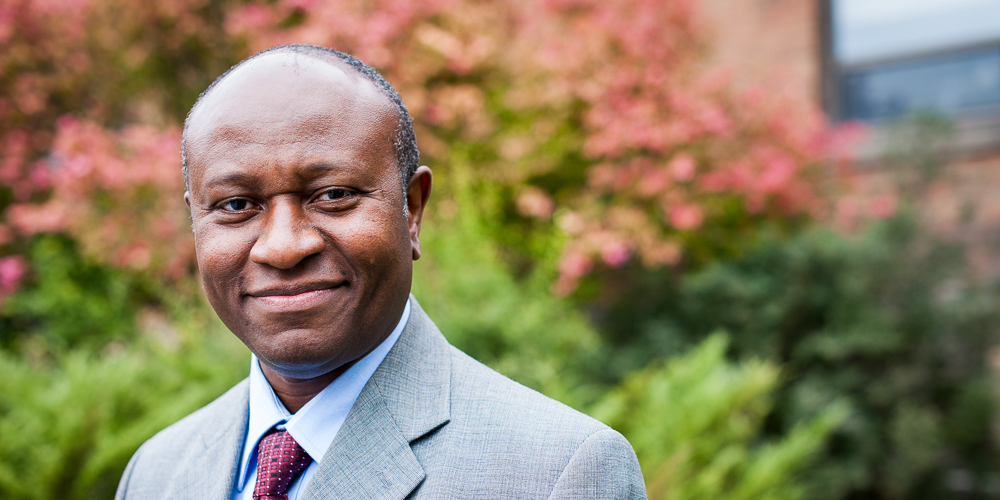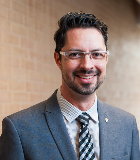Le professeur Michael Ngadi du département de génie des bioressources de l’Université McGill a passé sa vie à tenter de résoudre les problèmes alimentaires. Le présent article expose les résultats de recherche du professeur Ngadi en lien avec l’insécurité alimentaire et son approche pour améliorer la diète des communautés rurales vulnérables.
Article originalement publié le 6 février 2021 dans The Reporter par Valérie McLeod.
Crédit photo : Alex Tran (article rédigé en anglais)
The first wealth is health
Most recently, Ngadi and his research team traveled to remote communities in Bolivia, Laos, Zambia, Malawi and Ethiopia to examine elements of the local diets, assess their nutritional status, and build programs that would introduce nutrient-dense foods into local cuisines.
“Normally, if a project designer examines a rural area and determines that residents’ diet is mostly made up of high energy carbohydrates, he would likely introduce some meat, vegetables or legumes to increase protein in their diet, and bring in some vitamins and minerals,” says Ngadi. However, what is critical to the project’s success is not simply the introduction of nutrient-dense foods but giving people the skills and knowledge that are necessary to incorporate new dietary habits into their regular routines, he explains. “That requires more than just the promotion of backyard gardens or poultry farming for the community – it requires education, training, and ongoing follow up and support.”
The result was the development of a unique ‘large scale nutrition communication method’ (LaScaN) to educate, train and assist vulnerable populations to own their dietary changes. Further, the three-year project – made possible through funding from the International Fund for Agricultural Development (IFAD) – involved not only local participation, but also buy-in from governments and key actors in the food development chain.
Tracking progress
With programs in place, the next challenge was to determine the best way to track participants’ adoption of these new dietary practices and to evaluate their impact. To accomplish this, Ngadi’s team developed an artificial intelligence (AI) tool to collect appropriate metrics and evaluate the success of nutrition-sensitive intervention programs. And so, in partnership with an IT company, the Diet Tracker application was born.
“The idea is to give people either a phone or a mobile device and have them photograph their foods. The app is smart and recognizes what kind of food it is and then proceeds to analyze the nutritional profile of the food,” Ngadi explains. “Once the data is accumulated, it can be used to calculate relevant index and assign score for diet quality or diet diversity. That information can then help drive evidence-based decisions on nutrition-sensitive programs.”
Ngadi points out that the tool – although it gives policy makers and project designers valuable insight into participants’ dietary status – does not necessarily indicate how to address the unique food challenges facing each of these communities. “A tool allows people to know the situation and to plan accordingly. Aligning appropriate planning and intervention is important for better outcomes in mainstreaming nutrition and dietary changes.”
His team has also developed a separate platform – the ‘multi-criteria decision system’ – to complement the AI tool. “This system allows evaluation of dietary situations based on data collected from a region or community and offers specific recommendations that can be used to optimize strategies to mainstreaming nutrition,” Ngadi says. The system also allows his research team to track implementation of the recommended strategies and to gauge the success of their outcomes.
Making an impact
To date, the preliminary design of the AI tool has been completed and is being tested in different countries along with the multi-criteria decision system. The goal is to establish an effective tool and process that will ultimately make nutritious, affordable and sustainable food options more accessible to the rapidly expanding global population.
And evidence on the ground suggests that their approach is working, says Ngadi. “We’ve been tracking these programs for about 18 months to see whether our intervention strategies work, and all indications show that they do – I’m told, for example, that our LaScaN has been adopted by the World Food Program in some of their projects.”
À propos du professeur Ngadi
Growing up in Nigeria, Michael Ngadi knew he wanted to make an impact on the world, and although the bioresource engineer always dreamed he would catalyze big, new ideas, his career path was not a linear one.
“I knew very early on that I wanted to do engineering for sure; that was quite clear in my mind,” he recounts. “I had decided on aeronautical engineering, but just as I was filling out my application form, it dawned on me that aeronautical engineering would not make sense in the Nigerian context.”
Ngadi was looking for more than just a career – he was looking to make a positive contribution to his chosen field, his community, and the world. “Agricultural engineering held so much potential. At that time, it was an opportunity to do something new and exciting, something that had not been done before,” he recalls.
That leap of faith changed the course of his life in many unexpected ways – leading him to Halifax on a Canadian government scholarship to work on control sensor development and later, to pursue his PhD in Biochemical Bio Processing Engineering. His evolving career also revealed an underlying passion for food engineering and with it a desire to use his skills to help solve some of the world’s most pervasive food problems.
Comment trouver des solutions à l’insécurité alimentaire
Publié le 26 juillet 2021



